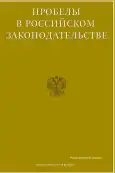The Evolution of Approaches to Determining the Principles of Law and Law-Making: Theory and Political and Legal Practice
- Authors: Zubov V.V.1
-
Affiliations:
- Financial University
- Issue: Vol 16, No 3 (2023)
- Pages: 27-36
- Section: Theoretical and Historical Legal Sciences
- URL: https://journal-vniispk.ru/2072-3164/article/view/250321
- EDN: https://elibrary.ru/BHTVKX
- ID: 250321
Cite item
Abstract
The proposed publication provides a comprehensive review of the historical path of changing approaches (theoretical and practical) to the definition of the principles of law and lawmaking and establishes the nature of the evolutionary process in political and legal matter. On the basis of the general dialectical method, analysis and comparative legal approach, the principles of law and lawmaking are identified and revealed, depending both on the level and degree of generalization (special, sectoral, intersectoral, universal), and on the specifics of the current or historical stage of development of political and legal reality, the content of the concept of «lawmaking» is established in direct connection with similar categories, the lawmaking process and types of lawmaking are characterized. In the course of the presentation of the material, the author establishes that the current Russian law is based on synthesis of the achievements of the main concepts of legal understanding - the natural law doctrine, positivism and the realistic school of law. It is indicated that in recent years the principles of law in Russia have been evolving against the background of the steady sovereignization of the domestic political and legal order. The definition of lawmaking is given as a purposeful activity of the competent authorities to change, establish or abolish legal norms, which is the highest form of expression of the process of lawmaking and an integral element of rulemaking, it is established that the principles of lawmaking should correlate with the actual principles of law. The conclusion is that the evolution of the principles of law and lawmaking is non-linear, it varies depending on the level of development of each individual legal order and the individual characteristics of the formation, functioning and development of society.
On the example of the domestic legal order the author shows that the reception of Western European principles of law, as the independence of the Russian Federation in the international arena was strengthened, was replaced by the construction of national legislation, taking into account the special historical path of the country and those traditional fundamental values that are immanent to the single multinational people of Russia.
Full Text
##article.viewOnOriginalSite##About the authors
Vadim V. Zubov
Financial University
Author for correspondence.
Email: zubov305@yandex.ru
ORCID iD: 0000-0001-6446-3221
Cand.Sci.(History), Associate professor, Department of political science
Russian Federation, MoscowReferences
- The Constitution of the Russian Federation // Collection of legislation of the Russian Federation. 2014. № 31. Art.4398.
- Civil Code of the Russian Federation. Part One // Collection of legislation of the Russian Federation. 1994. № 32. Art. 3301.
- Criminal Code of the Russian Federation // Collection of legislation of the Russian Federation. 1996. № 25. Art. 2954.
- Code of the Russian Federation on Administrative Offences // Collection of legislation of the Russian Federation. 2002. № 1. Art. 1.
- Arbitration Procedural Code of the Russian Federation // Collection of legislation of the Russian Federation. 2002. № 30. Art. 3012.
- Zakharova K.S. System connections of the principles of law: theoretical problems: Dissertation of the Candidate. jurid. sciences:12.00.01/ Saratov State Academy of Law. Saratov, 2009. 255 p.
- Kaitaeva H.I. Law-making in a state governed by the rule of law: Dissertation of the Candidate. jurid. sciences:12.00.01/ Moscow University of the Ministry of Internal Affairs of the Russian Federation. M., 2006. 178 p.
- Sidorkin A.S. Principles of law: concept and implementation in Russian legislation and judicial practice: Dissertation of the Candidate. jurid. sciences:12.00.01/ Peoples Friendship University of Russia. Moscow, 2010. 206 p.
- Chechelnitsky I.V. Justice in Law-making: theoretical and legal research: Dissertation of the Candidate. jurid. sciences:12.00.01/ Peoples Friendship University of Russia. Moscow, 2014. 286 p.
- Hegel G.V.F. The science of logic. In three volumes. Volume 2. M.: Mysl, 1971. 248 p.
- Hobbes T. Leviathan. M.: RIPOLL classic, 2016. 672 p.
- Kelsen G. Pure doctrine of law. St. Petersburg: Alef-Press Publishing House, LLC, 2015. 542 p.
- Locke J. Essays in three volumes. Volume 3. M.: Mysl, 1988. 668 p.
- Nietzsche F. About power. Moscow: AST Publishing House, 2018. 432 p.
- Rousseau J.-J. Political writings. St. Petersburg: Rostock, 2013. 640 p.
- Mandrikova E.A. Reasonableness in the system of requirements for rulemaking // National University «Yaroslav the Wise Law Academy of Ukraine». 2013. № 123. Pp.196-203.
- Filippov A.R. Axiomatic method of cognition of the nature of human rights // Gaps in Russian legislation. 2017. № 3. Pp. 318-322.
- Tsybulevskaya O.I., Kasaeva T.V. Social factors of legal education // Legal technique. 2012. № 6. Pp. 608-612.
- Decree of the President of the Russian Federation № 809 (November 9, 2022) «On approval of the Foundations of State Policy for the preservation and strengthening of traditional Russian spiritual and moral values» [Electronic resource]. URL: http://publication.pravo.gov.ru/Document/View/0001202211090019 (Accessed: 25/03/2023).
Supplementary files








